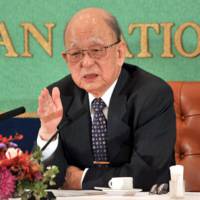Nobel Prize laureate Akira Suzuki urged Japanese youngsters Monday to study abroad and broaden their views, just as more are growing hesitant to do so.
The chemist also called on senior academics to make greater efforts to instill in younger generations a sense that science and technology are interesting, as science is crucial to the country's survival.
"(While I was abroad) I made many foreign friends. (I also got to know that) there is a world out there that we do not know," Suzuki said at a luncheon at Japan National Press Club in Tokyo. He spent two years from 1963 as a doctoral research fellow at Purdue University.
Speaking from his experience, Suzuki, professor emeritus at Hokkaido University, said studying abroad will also help improve foreign language proficiency. "If I take those things into consideration, it is extremely good for you to go abroad," he said.
Suzuki is one of the three recipients of the 2010 Nobel Prize in chemistry. He shared the prize with fellow Japanese scientist Eiichi Negishi, professor at Purdue University, and American chemist Richard Heck, professor emeritus at the University of Delaware.
Suzuki and Negishi have also been awarded the 2010 Order of Culture, the country's top cultural award.
On the declining popularity of science education among young students, Suzuki lamented the recent trend, noting that Japan has scarce natural resources and that new and useful products need to be developed, manufactured and exported.
"This is an extremely serious problem that cannot be left unrectified," he said.
Suzuki suggested that senior academics get the word out about science and technology and their importance.
He also said that science and education need a long time to produce results and the state should bear that in mind when making policy.



